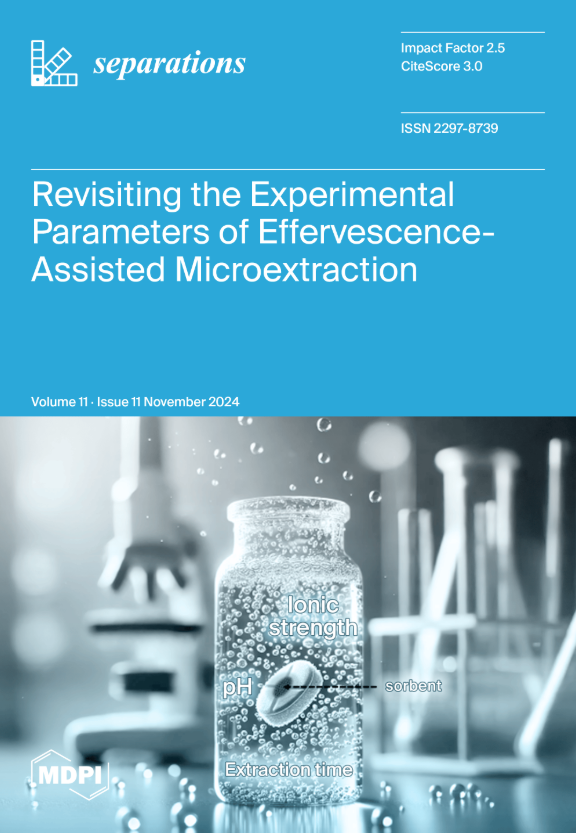Application of Choline Chloride-Based Deep Eutectic Solvents in the Synthesis of Hydrazones
IF 2.7
4区 工程技术
Q3 CHEMISTRY, ANALYTICAL
引用次数: 0
Abstract
The synthesis of 14 hydrazone compounds derived from pyridoxal, pyridine-4-carbaldehyde, and quinoline-2-carbaldehyde using two methods, conventional method in deep eutectic solvents (DESs) and effective combination of ultrasound and DESs, is presented in this paper. In addition, the possibility of using 12 choline chloride (ChCl)-based DESs as an alternative to organic solvents was investigated. The results show that the application of ultrasound not only improves the reaction yield but also shortens the reaction time. The prepared compounds synthesized at room temperature were analyzed via NMR spectroscopy and MS spectrometry. The studies confirmed that the DESs ChCl:malonic, oxalic, levulinic, and trans-cinnamic acid can be excellent alternatives to classical organic solvents. By the combined use of DESs and the ultrasonic method, compound 11 was obtained in a nearly quantitative yield of 98% in DES ChCl:oxalic acid. The advantages of using DESs as reaction media are that they are biodegradable, nontoxic, recyclable, and can be easily prepared with inexpensive starting materials. The results of recycling DESs show that they can be used up to the fourth recycling cycle without significantly changing the reaction yield.氯化胆碱类深共晶溶剂在腙合成中的应用
采用传统的深度共晶溶剂法和超声与深度共晶溶剂有效结合的方法合成了吡哆醛、吡啶-4-醛和喹啉-2-醛为原料的14个腙类化合物。此外,还研究了以12氯化胆碱(ChCl)为基的DESs作为有机溶剂替代品的可能性。结果表明,超声波的应用不仅提高了反应收率,而且缩短了反应时间。在室温下合成的化合物通过核磁共振光谱和质谱分析。研究证实,DESs ChCl:丙二酸、草酸、乙酰丙酸和反式肉桂酸是经典有机溶剂的优良替代品。采用超声法与DES法相结合的方法,在DES ChCl:草酸中以98%的定量收率得到了化合物11。使用DESs作为反应介质的优点是可生物降解,无毒,可回收,并且可以用便宜的起始材料轻松制备。结果表明,DESs可循环使用至第四次循环,反应产率无明显变化。
本文章由计算机程序翻译,如有差异,请以英文原文为准。
求助全文
约1分钟内获得全文
求助全文
来源期刊

Separations
Chemistry-Analytical Chemistry
CiteScore
3.00
自引率
15.40%
发文量
342
审稿时长
12 weeks
期刊介绍:
Separations (formerly Chromatography, ISSN 2227-9075, CODEN: CHROBV) provides an advanced forum for separation and purification science and technology in all areas of chemical, biological and physical science. It publishes reviews, regular research papers and communications. Our aim is to encourage scientists to publish their experimental and theoretical results in as much detail as possible. There is no restriction on the length of the papers. The full experimental details must be provided so that the results can be reproduced. There are, in addition, unique features of this journal:
Manuscripts regarding research proposals and research ideas will be particularly welcomed.
Electronic files and software regarding the full details of the calculation and experimental procedure, if unable to be published in a normal way, can be deposited as supplementary material.
Manuscripts concerning summaries and surveys on research cooperation and projects (that are funded by national governments) to give information for a broad field of users.
The scope of the journal includes but is not limited to:
Theory and methodology (theory of separation methods, sample preparation, instrumental and column developments, new separation methodologies, etc.)
Equipment and techniques, novel hyphenated analytical solutions (significantly extended by their combination with spectroscopic methods and in particular, mass spectrometry)
Novel analysis approaches and applications to solve analytical challenges which utilize chromatographic separations as a key step in the overall solution
Computational modelling of separations for the purpose of fundamental understanding and/or chromatographic optimization
 求助内容:
求助内容: 应助结果提醒方式:
应助结果提醒方式:


